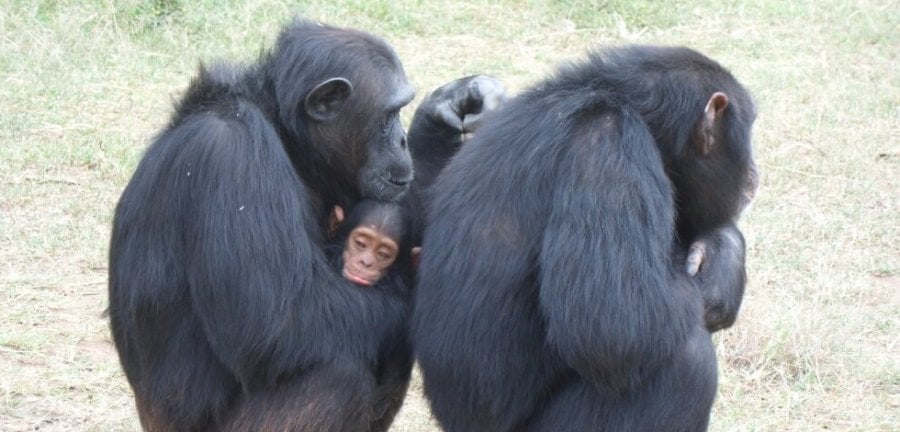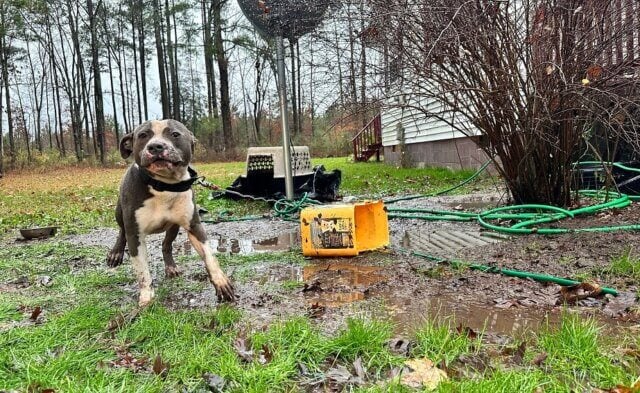Chimpanzees are more closely related to humans than they are to gorillas. Chimpanzees and humans share the same blood types and have at least 95 percent genetic similarity. These highly intelligent animals have long childhoods, cooperate with and learn from each other, make and use tools, and participate in cultural and social activities such as dancing in the rain.
While the United Kingdom, Japan, Austria, New Zealand, the Netherlands, and other countries have prohibited the use of great apes as medical test subjects, the United States continues to use approximately 1,000 chimpanzees in experiments. They are injected with drugs and infected with diseases that they would never contract under normal circumstances, and they are subjected to traumatic psychological tests and painful, invasive experiments.
Most of the other 1,300 captive chimpanzees in the U.S. are confined to zoos or used and abused in the entertainment industry. Only about 500 live in sanctuaries.
You’ve probably seen hundreds of movie scenes or advertisements in which a chimpanzee appears to be flashing a big, fat grin. The entertainment and advertising industries want us to chuckle at this expression. But once you’ve learned that this expression is actually a “fear grimace,” seeing it is heartbreaking.
Chimpanzees who are forced to perform are ripped from their mothers’ arms when they are only days old—a traumatic event that causes grievous distress to both mother and baby—and raised by humans.
Trainers want to get their hands on chimpanzees while they are still babies so that they become totally dependent on humans. Small and vulnerable, the babies can be forced to “perform” through psychological and physical intimidation.
In order to force the young apes to perform on cue, trainers often beat the animals into submission. One undercover investigation revealed that trainers used their fists, clubs, or even broom handles to show the animals who’s boss.
Through our great apes campaign, PETA is making significant progress in our effort to stop the abuse of these beautiful and intelligent animals. Our goal is to convince filmmakers, television producers, and advertising agencies to stop using chimpanzees and orangutans in their productions.
Since we launched the campaign, we have convinced numerous companies—most recently, Dodge, Pfizer, Capital One, Travelers Insurance, Samsung, and AT&T—to pull their commercials featuring great apes off the air. In one year alone, every new national ad featuring a great ape was pulled or modified after PETA informed the companies about the behind-the-scenes abuse.
Better still, we’re creating long-term changes by convincing companies to prohibit the use of great apes in their ads and promotions permanently. For example, following meetings with PETA, nine of the top 10 advertising agencies in the world—including Young & Rubicam, McCann Erickson, and BBDO—have pledged not to use great apes in future ads!
When we learned that Rise of the Planet of the Apes was going to be made, we asked the filmmakers not to use real apes. Those brilliant and kind filmmakers were also concerned about the welfare of animals and used computer-generated imagery to depict the apes instead, for which they received a PETA Proggy Award.
By the time chimpanzees are just a few years old, they become too strong for trainers to handle and are often “dumped” in squalid roadside zoos. With life spans of up to 60 years, chimpanzees can spend decades in these prisons after the entertainment and advertising industries have cast them aside.
PETA conducted an undercover investigation of one of these hellholes—the misleadingly named “Amarillo Wildlife Refuge” (AWR), an abysmal compound owned by heartless exotic-animal dealer Charles Azzopardi. Among the chimpanzees there was Chubbs, who had reportedly appeared in Animal Planet’s Monkey Movies and in the 2001 film Planet of the Apes.
As our undercover investigator documented, these chimpanzees lived in an underground concrete pit that resembled a dungeon. Piles of rotten food and feces swarming with flies and maggots covered the floor. These extremely intelligent animals spent their days staring at the walls, lying on a garbage-strewn metal resting platform, and screaming and fighting with one another because of the unbearable living conditions.
Following our investigation of AWR, Azzopardi was convicted in federal court of illegal animal trafficking.
PETA has also won important victories in behalf of chimpanzees in laboratories. As a result of PETA’s campaign, which garnered the support of Dr. Jane Goodall, the SEMA laboratory in Maryland stopped confining chimpanzees to cramped, barren isolation chambers.
In 2011, the National Institutes of Health (NIH) had plans to pull more than 200 elderly chimpanzees out of retirement and send them to a laboratory, where they would once again have been isolated in cages and tormented in painful infectious disease experiments. But PETA helped convince the NIH to cancel that plan!
In 1994, a PETA undercover investigator found 42 chimpanzees imprisoned in tiny cages in the windowless basement of the Buckshire Corporation—a company that supplies animals to laboratories.
Some of the females were used as “breeders” and had every single one of their babies taken away from them. Many were leased—like pieces of equipment—to laboratories for invasive experiments and used for hepatitis vaccine research, which subjected them to repeated, painful liver biopsies for more than two decades.
Our investigation spurred the U.S. government to issue sanctions against Buckshire—including a $25,000 fine—for violations of the federal Animal Welfare Act. Two of those violations resulted from keeping chimpanzees in cages that did not meet the minimum size requirements of 5 feet by 5 feet. Can you imagine that kind of privation? It would be as if you were locked inside a closet for your whole life!
Over time, the number of chimpanzees living at Buckshire dwindled, but we kept fighting for the ones who remained—and in a tremendous victory 14 years later, Buckshire released its last seven remaining chimpanzee prisoners!
With the support of Augustus Club members, PETA contributed $50,000 to help build a new home at Chimpanzee Sanctuary Northwest for the seven chimpanzees from Buckshire: Burrito, Annie, Foxie, Jamie, Jody, Missy, and Negra.
These seven friends now play, climb, and nap together and enjoy healthy food, sunlit rooms, a catwalk for climbing, and an outdoor play area with sunshine and fresh air. Never again will they be harmed or separated from one another.
What You Can Do
Congress has introduced the Great Ape Protection and Cost Savings Act (H.R. 1513/S. 810), which would permanently end the use of chimpanzees—and all other great apes—in invasive experiments and retire more than 600 federally owned chimpanzees to sanctuaries, where they could live in peace at last. Please help protect chimpanzees and other great apes now by asking your congressional representatives to cosponsor and support the Great Ape Protection and Cost Savings Act.
This article was originally published in PETA’s Augustus Club newsletter. For information on this club honoring those who are leaving a legacy for animals through a planned gift to PETA, please contact us.





